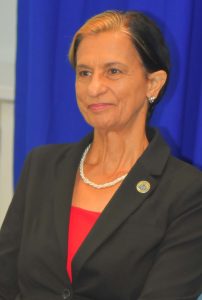Draft COHO-law encounters fierce criticism; PFP proposes alternative


PHILIPSBURG — Party for Progress MPs Melissa Gumbs and Raeyhon Peterson, as well as MP Sarah Wescot-Williams (United Democrats) have made their positions about the draft COHO-law clear ahead of the Inter-Parliamentary Kingdom Consultation (Ipko) that is currently taking place in St. Maarten.
While Wescot-Williams mainly points out her concerns about the draft law, the PFP-faction offers an alternative: the establishment of a new World Bank Trust Fund.
“The COHO (Caribbean Organization for Reform and Development) is simply a way to push through a plethora of matters via a new type of higher supervision,” MP Wescot-Williams states in a press release.
She points out that its predecessor CRE (Caribbean Reform Entity) was rejected because of “its far-reaching usurpation of the countries’ responsibilities and autonomy.” But the spirit of this construct is also part of the COHO, the MP states.
In this sense, the PFP-faction agrees. The faction cannot support the COHO because it puts “too much authority and unilateral decision-making” in the hands of the Dutch Minister of Home Affairs and Kingdom Relations.
MP Wescot-Williams notes that there is a need to revisit article 38 of the Kingdom Charter. Sub 1 of this article is the basis for the country packages, which she labels as “a far cry from a national reform agenda. It is a hodgepodge of reform areas.”
Furthermore, Wescot-Williams states that “COHO is a clever way to force the hands of government – a form of higher supervision without its legalities.”
With the PFP, the MP also finds common ground with the notion that the COHO infringes on the parliament’s budget right. “The government budget will now be vetted based on the reform package.”
MPs Gumbs and Peterson agree: “The draft law allows the Cft to test budget policies, but that is the responsibility of the parliament. It negates the parliament’s budget right.”
Wescot-Williams foresees that the problems the country encountered with the World Bank Trust Fund will repeat themselves with the TWO (Temporary Work Organization) and the COHO.
“The powers delegated to the COHO belong more in a type of development and investment bank-structure. This better fits small islands, ensuring that checks and balances are in place and that accountability has teeth.”
The PFP-faction envisions an agreement between the Netherlands, the World Bank and the Caribbean countries that establishes a new trust fund guided by a 5-member steering committee. Those members (one from each participant – the World Bank, the Netherlands, St. Maarten, Aruba and Curacao) ought to be appointed based on merit and not on political favoritism, Gumbs and Peterson state. They exclude the St. Maarten member of the current Trust Fund’s steering committee (Melissa Gumbs’ father Marcel) from selection for such a position. In this proposal, Aruba, Curacao and St. Maarten would each have a sub-committee, staffed with representatives from the World Bank, the Netherlands and the respective country.
The PFP somehow anticipates that this new trust fund will not necessarily become a reality. In that scenario, Gumbs and Peterson propose seven amendments to the current draft COHO-law.
They want to insert a dispute regulation, the establishment of the COHO in each of the Caribbean countries, the removal of the article that gives financial supervisor Cft more oversight of the budgetary process and the removal of the article that gives the Dutch Minister of Home Affairs and Kingdom Relations the authority to issue unilaterally instructions to the COHO. The PFP also wants to insert an article that enables the conversion of loans into grants if certain conditions are met, to eliminate the the12.5 percent cut in the labor conditions for civil servants by the end of the year and to include provisions for the training of local human resources.
###
Related links:
Press release MP Sarah Wescot-Williams about COHO
Position paper PFP about COHO






















